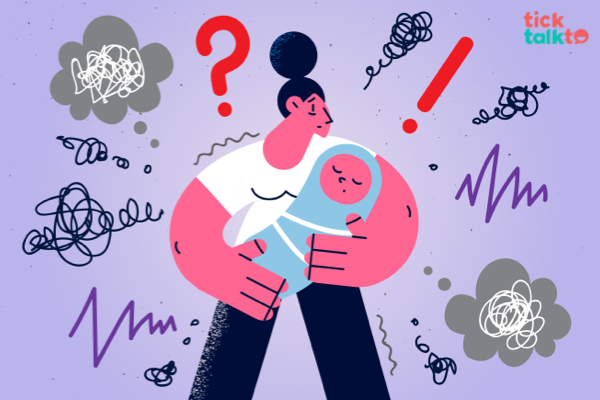Motherhood is the most blissful experience for any woman. The happiest moment to cherish with the newborn and family. But motherhood comes with its own set of woes and blues. The responsibility of the baby, hormonal changes, sleep deprivation, and physical condition disrupts the normal life of the new mom. All of these lead to Postpartum Depression. Hence, the older women at home used to be the primary caregivers and used to look after the mother and baby exclusively. This allowed them to get proper emotional, physical, and mental support.
Postpartum depression (PPD) is a condition that can develop in women generally after childbirth as the name suggests. This condition is triggered by the change in hormone levels immediately after childbirth. Many new moms experience this, which is also termed as “baby blues”. Postpartum Depression starts immediately after childbirth and may last from a week to a month. The severity depends on the mental, emotional, and physical condition of the new mother, and the kind of support one is receiving from the primary caregivers or family. This phase is very intense and needs clinical intervention too sometimes. This article will discuss the symptoms and the treatment options.
When postpartum depression ends
Clinicians time and time again have noted an association between the postpartum period and mood disturbances. This linkage entered official psychiatric nomenclature in 1994, when the Diagnostic and Statistical Manual of Mental Disorders, Fourth Edition defined major depression with postpartum onset as episodes of depression beginning within 4 weeks of giving birth. This time period corresponds to the rapid hormonal changes posited to contribute to vulnerability to depression. However, because psychosocial factors also play a major role in triggering postpartum depression, most researchers use a working definition of the postpartum period as lasting up to 6 months after delivery.
How postpartum depression feels
We might have come across many stories where the new mother refused to look at her baby’s face, stopped breastfeeding, threw away the baby, or hit the newborn. This might sound bizarre and insane but all these are the symptoms of extreme levels of Postpartum depression. One might also feel extremely cranky, get irritated, develop anger management issues, feel helpless & hopeless most of the time, and feel constantly weak mentally.
While these feelings usually pass within a week or two, they can last up to a month. If the symptoms persist longer, you should contact your doctor. One can check for signs of postpartum depression and help yourself manage your symptoms with the help of your medical practitioner and a therapist.
There are many treatments for postpartum depression that can help a new mother feel better. Early treatment is essential, as the sooner you seek treatment, the better.
Why postpartum depression happens
Postpartum depression is a very common psychological condition after childbirth. It can be caused by several factors, including physiological changes and psychological stress. Some women are at higher risk for this condition due to genetics or other factors. Some women may also experience difficulties in relationships. These factors can lead to feelings of hopelessness and worthlessness.
One of the most effective ways to treat postpartum depression is to focus on self-care. Motherhood is much more demanding than a traditional job, so it is important to remember to take time to nurture & nurse yourself and get outside. Keeping in touch with other people is another important way to prevent depression.
Postpartum depression treatment
Postpartum depression treatment can be a difficult challenge for new moms, but there are ways to get relief from this condition. It is important to first properly diagnose Postpartum depression. A trained therapist and use of psychological tests like Edinburgh Postnatal Depression Scale (EPDS) can help diagnose PPD. If you suspect, you might be suffering from PPD, you can use the TickTalkTo app to take the EPDS test and speak with a therapist.
Choosing the best treatment depends on your individual needs, as well as your doctor’s recommendations. Treatment may also include addressing underlying health conditions or mental health issues. During your recovery, it is important to accept help from friends and family members. Support of immediate family members is imperative.
A physician can prescribe antidepressants to help a woman deal with the symptoms of PPD. Non-pharmacologic treatment is also an option for women who are struggling with PPD. It’s important to seek treatment early to prevent further complications. If the condition is not detected in time, it can lead to further problems for the mom and her child. Among other things, untreated postpartum depression can cause sleeping and feeding difficulties, as well as impairment of the child’s cognitive development. If you’re struggling with PPD, it is always in your best regard to seek counselling for yourself.
5 ways to manage postpartum depression at home
1. Exercise
There are many ways to deal with postpartum depression, and exercise is one of them. If you’re looking for a new exercise routine, try going for a short walk or taking up yoga. It may be difficult to find time to exercise, but even fifteen minutes a day can help you feel better. Any mild exercise as advised by your physical will prove beneficial in the upkeep of your mental and emotional health. Also, keep a diary that documents your thoughts and feelings each day. Reading over these entries can help you feel better about yourself and help you recover.
2. Avoiding isolation
Avoiding isolation during the postpartum period is crucial if you are dealing with postpartum depression. Many women find themselves socially isolated, either due to the time off work or quitting their jobs or because of their new role as a mother. Although the degree of isolation differs from woman to woman, it’s still an important aspect to keep in mind.
Stay-at-home orders also increase the chances of social isolation for new mothers. Social isolation can be traumatic, especially for new mothers who are suffering from postpartum depression. In addition, it may be important for new moms to know about the support networks they have available and the resources they can turn to when postpartum depression begins to affect them. Reach out to your mother, and other experienced women in the family to get support.
3. Getting a break from the baby
The lack of “Me Time” is one of the major reasons for postpartum depression. One of the best ways to deal with postpartum depression is to get a break from the baby. New moms need time to recover, and getting a break from the baby will help them feel more like themselves again. In addition, it can help new moms maintain important relationships and maintain their physical and mental health. Get back to catching up with family and friends over a phone call or visit them personally if allowed by your gynec depending upon your condition.
Hire a nurse who will help you with the babysitting for some time so that you can get some “me time”
4. Getting enough sleep
One of the best things to do to deal with postpartum depression is to get as much sleep as possible. Getting enough sleep is crucial for women and new mothers. Although sleep is an important part of parenting, most resources focus on the infant’s sleep, and not on the mom’s sleep. New mothers who have experienced PPD are at higher risk of developing the disorder again.
Although the exact mechanism is not known, it’s clear that poor sleep can contribute to depression. Sleep deprivation can last up to 12 months after childbirth, and the lack of sleep can cause exhaustion, irritability, and poor quality of life. Not only does it contribute to postpartum depression, but it can also lead to a host of other health problems.
5. Hire a full-time Caretaker
Due to various reasons, immediate family members are unable to provide the role of primary caregiver sometimes. This adds to the woes as the affinity to reach out to help is unavailable and when a new mother has to manage everything on her own she is exhausted mentally, physically, and emotionally. Hence, hiring a full-time caregiver to take care of the baby and new mother is inevitable.
Postpartum depression prevention
There are several interventions available for women facing postpartum to reduce the risk of postpartum depression. These include telephone peer support, interpersonal psychotherapy, and postpartum visits by a nurse or midwife. A recent meta-analysis concluded that cognitive behavioral therapy and interpersonal therapy were effective at reducing postpartum depression.
Parents, in-laws, and other elderly women have always been excellent support during this tough phase offering the best help without even asking for it. One can always vouch for their help and count on the experiences they share. This support system from family is imperative and one can rely upon this without giving a second thought. But in the absence of this family support system, one should reach out to other resources for help. Getting help for other household chores also will reduce the workload and the new mom will be able to get enough rest. Sharing the load of work and baby care, and emotional, physical, and mental support from her husband is the biggest strength for a woman in these tough times. This strengthens their bond and generates an overall positive environment for the upbringing atmosphere for the baby as well.
Online counselling for Postpartum depression
Getting help from online counselling is an excellent way to deal with new mom blues. The best part is one can avail of the services and help while being in their comfort zones and in a relaxed atmosphere and one’s convenient time.
At TickTalkTo we have a team of experienced counsellors like Jiniya Dikshit, Thasneem Kauser, Mridula Sharma, Shalini Tyagi, and Rohini Karhadkar to help you whenever you need our support. A new mom needs a lot of emotional and mental support to deal with their PPD. One can talk about one’s issues without the fear of being judged. Psychotherapy/ Counselling are an excellent way of treating Postpartum Depression. Feel free to contact us and get the best help.

 Lavanya Vallabh
Lavanya Vallabh


